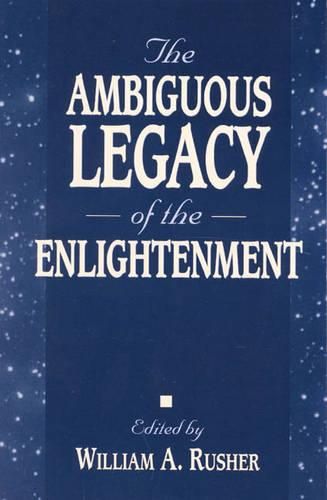Readings Newsletter
Become a Readings Member to make your shopping experience even easier.
Sign in or sign up for free!
You’re not far away from qualifying for FREE standard shipping within Australia
You’ve qualified for FREE standard shipping within Australia
The cart is loading…






As the twentieth century closes, having withstood two world wars, a massive economic depression, and the rise of murderous, despotic regimes that based their existence on rationalistic theories, the legacy of the Enlightenment has come under new scrutiny. This new collection of essays from the Claremont Institute examines both the beneficial aspects of the Enlightenment as well as those considered detrimental. Including essays by political and social scientists such as Charles Kesler and Ernest van den Haag as well as scientists like Edward Teller and Sir Fred Hoyle, this book examines why in the postmodern world of the late twentieth century, the application of reason, rationalism, and the scientific method to explain natural, social, and economic phenomena takes place almost without a second thought. While these modes of looking at the world have provided considerable benefits, especially when related to the natural realm, the perpetual use of reason and rationalism to explain man’s existence has nudged theology aside, allowing secular humanism to displace reliance on a divine Providence and often leaving mankind spiritually adrift. Co-published with the Claremont Institute.
$9.00 standard shipping within Australia
FREE standard shipping within Australia for orders over $100.00
Express & International shipping calculated at checkout
As the twentieth century closes, having withstood two world wars, a massive economic depression, and the rise of murderous, despotic regimes that based their existence on rationalistic theories, the legacy of the Enlightenment has come under new scrutiny. This new collection of essays from the Claremont Institute examines both the beneficial aspects of the Enlightenment as well as those considered detrimental. Including essays by political and social scientists such as Charles Kesler and Ernest van den Haag as well as scientists like Edward Teller and Sir Fred Hoyle, this book examines why in the postmodern world of the late twentieth century, the application of reason, rationalism, and the scientific method to explain natural, social, and economic phenomena takes place almost without a second thought. While these modes of looking at the world have provided considerable benefits, especially when related to the natural realm, the perpetual use of reason and rationalism to explain man’s existence has nudged theology aside, allowing secular humanism to displace reliance on a divine Providence and often leaving mankind spiritually adrift. Co-published with the Claremont Institute.